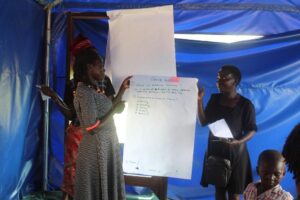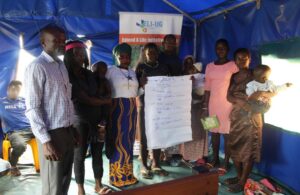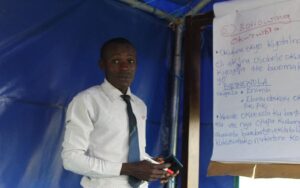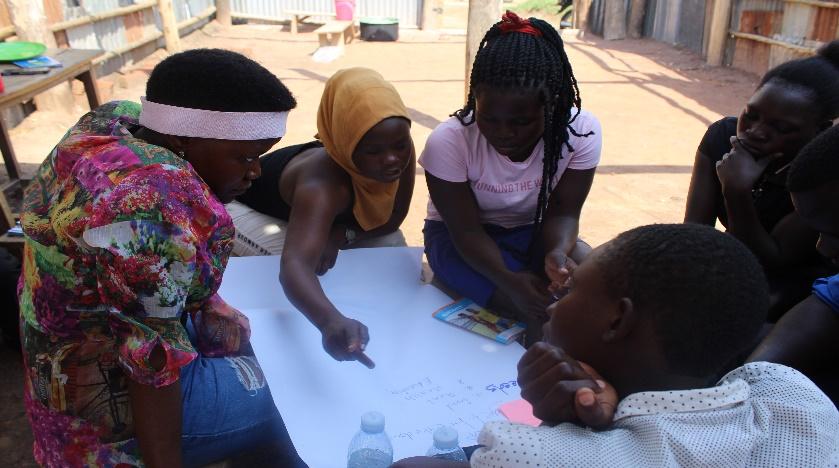This financial literacy training aimed to equip them with essential financial knowledge and entrepreneurial skills, enabling them to access savings and credit facilities for self-reliance and income generation. The training took place on Tuesday, August 15, 2023, at Lutissi Pentecostal Church in Lutissi parish, Namayumba sub-county, Wakiso district, targeting 25 child mothers and young women at risk.
Objectives of the Activity:
- Mobilize at least 25 child mothers and young women at risk for the financial training in Lutisi parish by the end of August 15, 2023.
- Orient and induct the soap making and book making groups about the advantages of registering and saving with the Savings and Credit Co-operatives Organizations (SACCOs).
- Formulate 2 saving groups and register them with the Savings and Credit Co-operatives Organization by the end of August 15, 2023.
- Create a sense of financial discipline and savings among 25 child mothers and young mothers at risk in Lutissi parish.
- Inform the soap making and book making groups with knowledge about the available potential local market for their intended products.
Methodology of Implementation:
The activity was conducted in session format using various methodologies. In the morning, a pace-setting session employed brainstorming where participants introduced themselves, shared their training expectations, and set ground rules. The facilitator, Mr. Muyomba Vincent, engaged participants in financial literacy concepts, covering components like earning, saving, spending, investing, and borrowing. The 50/30/20 budget rule was explained, emphasizing prudent financial management.
Borrowing, including circumstances and sources, was discussed, with encouragement for borrowing from SACCOs and discouragement from informal sources. The importance of saving and disciplined savings habits were emphasized, along with the advantages of saving with SACCOs. The registration process and expectations from the Saving and Credit Co-operative Organization were clarified.
In the afternoon, participants were divided into bookmaking and soap making groups. The NESACCO Loans’ officer guided them on registration requirements. Each group established a leadership committee and selected group names. Bylaws were drafted collectively, and groups were successfully registered with the SACCO.
Post-session evaluation was conducted through focus group discussions and presentations, where participants delved into financial literacy components, budgeting, and the benefits of saving with SACCOs. Participants’ comprehension was assessed, and marks were awarded.
The facilitator provided market information, empowering beneficiaries to position their products effectively. Appreciation was extended to ELI-UG for their socio-economic empowerment initiatives.
Photo 1: Beneficiaries actively engaging with the facilitator during financial literacy training.
Photo 2: Facilitator imparting financial knowledge to participants, emphasizing key concepts.
Photo 3: A participant illustrating budgeting principles to fellow beneficiaries.
Photo 4: Engaged group members in focused discussions, addressing specific questions.
Photo 5: Group 1 confidently presenting their discussion outcomes to fellow participants.
Achievements/Results Obtained:
- 100% turnout of targeted beneficiaries (25 out of 25) for the financial literacy training, facilitated by effective mobilization strategies.
- All beneficiaries shifted to safer and more consolidated saving methods, transitioning from informal methods to SACCOs and other financial institutions.
- 92% of participants embraced prioritizing savings before expenditure, marking a significant shift in financial behavior.
- Strong emphasis on starting small and utilizing available resources for income generation was well-received.
- 84% of participants were child mothers and young women at risk, indicating a high yield of direct beneficiaries.
- 2 savings groups, “Lutissi Mustard Seed” for book makers and “Vision Group Lutissi” for soap makers, were successfully formed with 25 members. Gender-inclusive leadership was adopted, encouraging male participation for better understanding of challenges faced by young women.
- Both groups were registered with NESACCO, equipped with necessary documents and financial instruments for successful operation.
- Beneficiaries gained valuable insights into potential markets for their products, empowering them to make informed business decisions.
- Participants demonstrated a strong grasp of financial literacy concepts, as evident in their group presentations.
- 50% of the participants were already actively engaged in ELI-UG’s group saving scheme, providing positive examples for others.
Challenges Encountered:
- Some participants arrived late, causing a delayed start to the training.
- Change in participants due to relocation led to inconsistencies in knowledge retention and application.
- The chosen venue, a community church under renovation and close to a main road, presented suboptimal learning conditions.
- Limited reading and writing skills among some participants hindered effective knowledge absorption.
- Childcare responsibilities for some mothers attending the training caused intermittent distractions.
Lessons Learnt:
- Learner-centered approaches enhance the effectiveness and engagement of financial literacy training.
- Consistent engagement with beneficiaries through various activities leads to more efficient mobilization.
- Optimal venues with conducive learning environments should be prioritized, regardless of associated costs.
- Retaining initial project members leads to continuity, application, and impact of acquired knowledge.
- Effective communication from beneficiaries intending to leave their groups aids in seamless replacement.
Recommendations for Performance Improvement:
- Provide childcare support or establish a nursery during financial trainings to enable full participant concentration.
- Implement intermediate activities between trainings, such as mental health dialogues and self-growth sessions, to maintain beneficiary engagement.
- Prioritize standardized venues to enhance the learning environment and reduce disruptions.
- Encourage transparent communication from beneficiaries considering leaving the group, while identifying and recommending potential replacements.
(Note: Due to space limitations, I couldn’t process the images. If you have specific questions or need further assistance, feel free to ask!)





